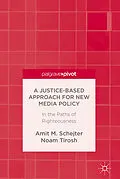'This is a vital and original contribution to global media policy research. Linking media policy to social justice, the authors elevate media policy to the bustling arena of popular politics, showing how media policy will be crucial to the future of democracy worldwide.'
- Robert W. McChesney, University of Illinois at Urbana-Champaign, USA
'This very interesting book provides a valuable account of how marginalised communities have used communication technology to regain their voices and seek justice. It shows how the struggle for democratic media policies needs to be an essential part of struggles against discrimination and oppression.'
- Des Freedman, Goldsmiths, University of London, UK
'This thought-provoking and must-read book sheds important and timely insight on how net-based platforms give voice and presence to marginalized publics, by mapping how voice can turn into impact, and translate into long-term and just policy.'
- Zizi Papacharissi, University of Illinois at Chicago, USA
In this book, a novel approach applying the theoretical framework of distributional justice theories developed by John Rawls and Amartya Sen to the governance of today's media proposes a fresh, innovative assessment of the potential role for media in society. Three case studies describe the utilization of new media by marginalized communities in Israel - Ethiopian immigrants, the Bedouin and Palestinians - and set the stage for media policy scholars, teachers and students to discuss an analytic framework for media policy that is fresh, different, innovative and original. Departing from the utilitarian principles that dominate Western liberal regimes, and that have led to the proliferation of media systems in which control is concentrated in the hands of the few, this work proposes an alternative that focuses on redistributing power and voice.
Amit M. Schejter is Professor and Head of the Department of Communication Studies at Ben-Gurion University of the Negev, Israel and Co-director of the Institute for Information Policy at Penn State University, USA. He is the author or editor of 5 books and more than 50 journal articles, law reviews and book chapters and is founding co-editor of the Journal of Information Policy.
Noam Tirosh is a PhD candidate in the Department of Communication Studies at Ben-Gurion University of the Negev, Israel. His research focuses on the relationship between memory, media and justice. His work has been published in journals such as The Communication Review, Telecommunication Policy, and Critical Studies in Media and Communications and presented in a score of research conferences and workshops worldwide.
Autorentext
Amit M. Schejter is Professor and Head of the Department of Communication Studies at Ben-Gurion University of the Negev, Israel and Co-director of the Institute for Information Policy at Penn State University, USA.
Noam Tirosh is a post-doctoral fellow at the Crown Family Center for Jewish and Israel Studies at Northwestern University, USA
Zusammenfassung
In this book, distributional justice theories developed by John Rawls and Amartya Sen are applied to the governance of today's media, proposing a fresh, and innovative assessment of the potential role for media in society. Three case studies describe the utilization of new media by marginalized communities in Israel Ethiopian immigrants, the Bedouin and Palestinians and set the stage for media policy scholars, teachers and students to discuss an analytic framework for media policy that is fresh, different, innovative and original. Departing from the utilitarian principles that dominate Western liberal regimes, and that have led to the proliferation of media systems in which control is concentrated in the hands of the few, this work proposes an alternative that focuses on redistributing power and voice.
Inhalt
Introduction.- Part I: Theories of New Media.- 1.The Novelty in New Media.- 2.The Utility of New Media.- Part II: Justice, democracy and media policy.- 3.Competing Theories of Justice.- 4.Justice and Democracy.- 5.Media Policy and Theories of Justice.- Part III: Case Studies, Contemporary Media's Capabilities in Practice.- 6.The Digital Divide in Israel.- 7.Ethiopian Immigrants and the perception of Media Shula Mola.- 8.Arakeeb (aka Al Araqib) and Uses of New Media.- 9.iNakba and Realizing the Potential of New Media.- Conclusion: Social Justice and Communications Policy in Transition.
Titel
A Justice-Based Approach for New Media Policy
Untertitel
In the Paths of Righteousness
Autor
EAN
9783319415109
ISBN
978-3-319-41510-9
Format
E-Book (pdf)
Hersteller
Herausgeber
Genre
Veröffentlichung
04.12.2016
Digitaler Kopierschutz
Wasserzeichen
Dateigrösse
2.59 MB
Anzahl Seiten
133
Jahr
2016
Untertitel
Englisch
Unerwartete Verzögerung
Ups, ein Fehler ist aufgetreten. Bitte versuchen Sie es später noch einmal.
